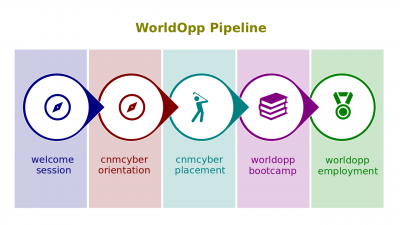Difference between revisions of "Sourcing Strategies"
(→Script) |
|||
| Line 11: | Line 11: | ||
===Script=== | ===Script=== | ||
| + | :In [[recruitment]], [[sourcing]] is the process of identifying possible [[source]]s to satisfy [[recruitment need]]s. In plain English, a source of ''recruitment'' is any place that generates qualified [[job applicant]]s. | ||
| + | :For instance, the internal sources of recruitment are the current [[employee]]s of the employing organization. If an [[employer]] hires graduates for [[entry-level job]]s, a [[university]] sounds like a probable ''source''. [[Recruiter]]s must find the sources where they can find qualified ''employment candidates''. | ||
| + | |||
| + | :''Recruiters'' may look for those [[worker]]s who are active on the ''market'', as well as those who are not. | ||
| + | |||
| + | :Most of [[employer]]s use [[in-network message]]s to find the ''sources''. These messages are sent to the [[employee]]s and those stakeholders who are in the organizational network. These messages contain the information about the [[employment vacancy]] and, possibly, about a [[referral fee]]. A referral from a current employee significantly simplifies screening and is a credential itself. | ||
| + | |||
| + | :[[Employment resource]] is any external resource, usually, but not necessarily, web-based, that allows for matching ''employers'' and ''employment candidates''. [[Employment website]]s and [[freelance marketplace]]s are examples of these ''resources''. | ||
| + | |||
| + | :While expecting known or unknown [[employment vacancy|employment vacanci]]es, ''employers'' may build their [[candidate pipeline]]s. The ''pipeline'' is a pool of qualified [[worker]]s interested in learning about [[job opportunity|job opportuniti]]es as they become available at the employing organization. | ||
| + | |||
| + | :The [[pipeline candidacy|pipeline candidaci]]es typically (a) meet or exceed the requirements identified in the estimated [[job description]], (b) have communicated with the employer's recruiters, (c) have expressed favorable views of the employing organization and agreed to receive notifications when relevant job opportunities open up, (d) have screened at some level, (e) stay in contact through personalized emails, [[newsletter]]s, and/or other forms of communication. | ||
'''[[Worker Competences]]''' is the successor [[lectio]]. | '''[[Worker Competences]]''' is the successor [[lectio]]. | ||
==Quiz== | ==Quiz== | ||
Revision as of 19:25, 10 May 2020
Sourcing Strategies (hereinafter, the Lectio) is the second lesson part of the Sourcing Essentials lesson that introduces its participants to employment vacancies and related topics.
This lesson belongs to the Introduction to Recruitment session of the CNM Cyber Orientation. The Orientation is the second stage of the WorldOpp Pipeline.
Contents
Content
The predecessor lectio is Position Requirements.
Key terms
- [[]].
Script
- In recruitment, sourcing is the process of identifying possible sources to satisfy recruitment needs. In plain English, a source of recruitment is any place that generates qualified job applicants.
- For instance, the internal sources of recruitment are the current employees of the employing organization. If an employer hires graduates for entry-level jobs, a university sounds like a probable source. Recruiters must find the sources where they can find qualified employment candidates.
- Recruiters may look for those workers who are active on the market, as well as those who are not.
- Most of employers use in-network messages to find the sources. These messages are sent to the employees and those stakeholders who are in the organizational network. These messages contain the information about the employment vacancy and, possibly, about a referral fee. A referral from a current employee significantly simplifies screening and is a credential itself.
- Employment resource is any external resource, usually, but not necessarily, web-based, that allows for matching employers and employment candidates. Employment websites and freelance marketplaces are examples of these resources.
- While expecting known or unknown employment vacancies, employers may build their candidate pipelines. The pipeline is a pool of qualified workers interested in learning about job opportunities as they become available at the employing organization.
- The pipeline candidacies typically (a) meet or exceed the requirements identified in the estimated job description, (b) have communicated with the employer's recruiters, (c) have expressed favorable views of the employing organization and agreed to receive notifications when relevant job opportunities open up, (d) have screened at some level, (e) stay in contact through personalized emails, newsletters, and/or other forms of communication.
Worker Competences is the successor lectio.
